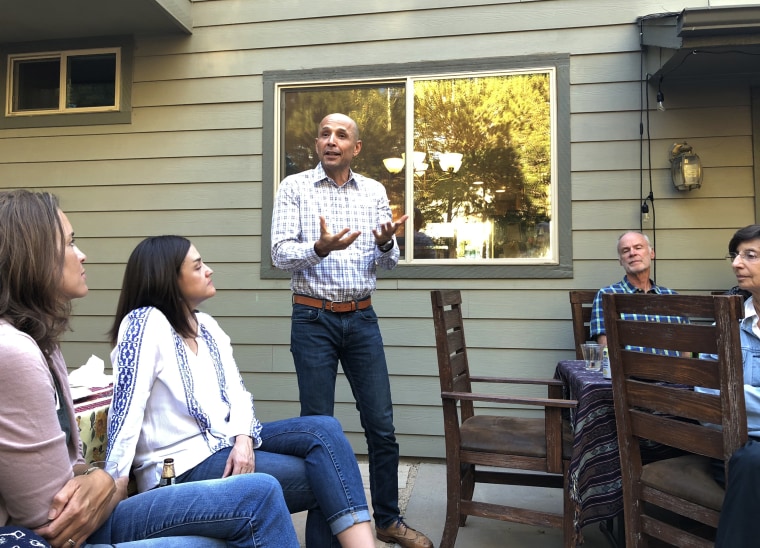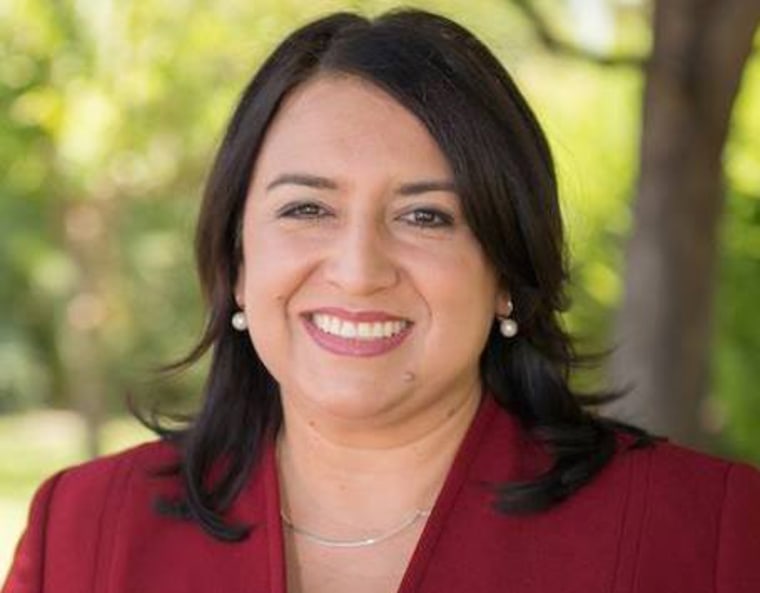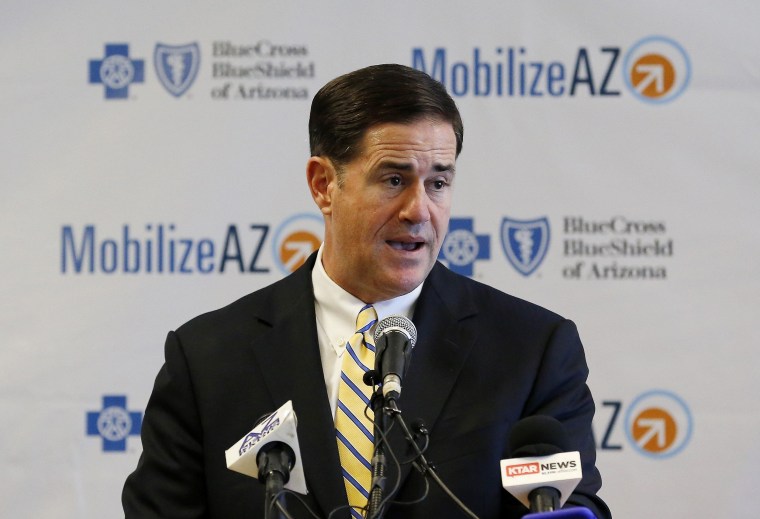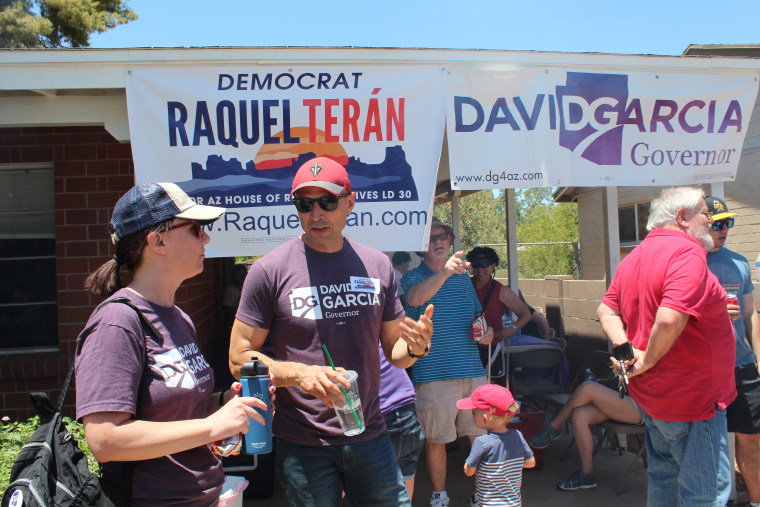FLAGSTAFF, Ariz. — With two Latinos at the top of Arizona's Democratic Party ticket, the state will be something of a test case this fall for whether the party's efforts on candidate diversity will draw more Latinos to the polls.
The two Latinos are David Garcia, who is running for governor, and January Contreras, running for attorney general.
Garcia entered the race pitching himself as the education candidate in a state where education ranks near the bottom in the country.
Garcia, who has a doctorate degree in education from the University of Chicago and is a professor at Arizona State University, lost his race for the state's schools superintendent in 2016 by half of a percentage point. However, as he often reminds audiences at campaign events, he outperformed all other Democrats in a state where Republicans dominate politics.

Contreras spent her career serving the public after graduating from law school at the University of Arizona.
At the Department of Homeland Security, Contreras led the Council on Combating Violence Against Women and served on the White House Council on Women and Girls under President Barack Obama. She served as an adviser to former Arizona Gov. Janet Napolitano, who was the state's last Democratic governor and later homeland security secretary under Obama.
Organizers and voters alike consider Garcia and Contreras’ presence on the ballot to be a potentially historic moment and opportunity. There are now almost a million Latino eligible voters in Arizona, but Latino turnout dipped from 2012 to 2016, and with 2018 being a midterm election, Democrats will need to break that trend if they expect Garcia and Contreras to win.
Grass-roots organizations have been working at registering voters in the Latino community, and with two Latinx at the top of the ticket, the pitch to register new voters may now resonate better than ever. In a telephone interview with NBC News, Abril Gallardo, the communications director for Living United for Change in Arizona, Lucha, said that in the past, community groups like Lucha have had to accept the hand they were dealt and try to organize voter support around the chosen candidate.
“For many years in every election cycle we faced, we’d look and say, ‘Well, these are our options now' and then they go off and serve their term and we find moments where they aren't representing us,” Gallardo said.
But Gallardo said she thinks this election can be different. “I am excited and hopeful we can have a different Arizona with David Garcia. I’m excited to see someone I can relate to. I think about the moments where we have gone to the state Capitol to talk to the governor and they won’t even let us in,” Gallardo said. Research has long shown that candidates who share the same ethnicity can be a mobilizing force for Latinos if those candidates come off as authentic.
The primary election in August recorded a staggeringly impressive turnout for Arizona, particularly among Democrats, long notorious for low turnouts in off-year elections. Overall, over 200,000 more voters participated in the primary compared to the previous record in 2010.
That increased engagement appears to be keeping Garcia and Contreras' races close, according to polling data.
The Contreras campaign said in a statement Monday that their polling data shows them just 2 percentage points behind Attorney General Mark Brnovich, a statistical tie. The firm Public Policy Polling released data showing Garcia 1 percentage point behind Arizona Gov. Doug Ducey, also a statistical tie. However, some analysts aren't quite buying those results. Larry Sabato's Crystal Ball rated the governor's race "leans Republican" and the Cook Political Report called it a "likely Republican" win.
In the 2016 presidential race, Donald Trump won the state with 48.6 percent of the vote to Hillary Clinton's 44.6 percent.

Garcia and Contreras are playing up that they are fourth-generation Arizonans running against Republicans born in other states; Ducey was raised in Toledo, Ohio, and Brnovich was born in Detroit. Brnovich pronounces his name on his website "Burn-O-Vich".
But as Latinos, both Garcia and Contreras are well aware of what their ethnicity brings to the conversation — pro and con.
The Republican Governors Association recently ran an ad painting Garcia as an “open borders” candidate with a radical agenda.
“That message is certainly going to be coming from Republicans," Garcia told NBC News. "They are pushing scare tactics around.”

In an email response from the Ducey campaign, campaign spokesman Patrick Ptak said: "Go tell the ranchers and residents in our border counties that we don't have a problem. There, this isn't a political debate — it's real life. Governor Ducey has met with them on a consistent basis and heard firsthand about their concerns, particularly when it comes to drug cartels and human traffickers. Governor Ducey is focused on making sure those living along our border, and all Arizonans, feel safe and secure."
Ducey also announced this week that the National Border Patrol Council, the Border Patrol's union, and Arizona locals of the union had thrown their support behind him.
As an Army veteran and an educator, Garcia said that contrary to the message from the Ducey campaign, his life has been about service to Arizona and protecting the U.S. borders. “I think when people talk to me, they see those lies, and I have spent a lifetime in service not only to Arizona but to the country,” he said.
Garcia recently came under some fire when he called for "replacing ICE with an immigration system that reflects our American values".
Like Contreras, however, Garcia hopes that his deep roots in Arizona will be enough to counter the Republican narrative. Both are quick to point out their family history and their service to the country. Contreras said her background gives her a strong sense of ownership for her home state and her country.
“My dad’s family is from Bisbee (Arizona). In Nogales, there is a monument with my grandfather's name on it,” Contreras said. Contreras’ father was in the Air Force and her grandfather was a paratrooper in World War II. “Love for country is embedded in my family, “ she said.
Given their family history, it is not surprising to hear both candidates talk about their races from a broader perspective, and it is not lost on them what their place in history would be should they win.
“I was the first in my family to go to college,” Garcia said at a fundraiser in Flagstaff. “It's kind of a cool thing because I had not seen anybody with my last name, or a last name like mine, on the ballot ever in my voting lifetime and we hear over and over from our team that it's out there. I hear it over and over again from people that that's different, that's inspiring,”
Gallardo and many of Garcia’s young Latinx campaign workers have been in politics a long time, despite their age. Gallardo got involved in 2010 when, as she sees it, the state attacked her family by passing the notorious anti-immigrant law, SB1070, the "show me your papers" law that has since been gutted by the Supreme Court.
“I knew my family was under attack and I had a choice to hide or to fight back," Gallardo said.
Gallardo’s group and others like it have been gathering strength from the anti-immigrant sentiment that gave the state SB1070.
“The work didn’t begin with SB1070, but with people like Russell Pearce and Arpaio,” Gallardo said. Pearce, a former Arizona state senator, was voted out of office in 2011, just a year after SB1070, by an upswell of organizing that eventually caught up to Sheriff Joe Arpaio.
“In Arizona, we had our own Trump with Arpaio. We’ve been here before. We can organize,” Gallardo said.
NBC Latino contributor Stephen A. Nuño, Ph.D., is chair of Politics and International Affairs and associate professor of politics and International Affairs at Northern Arizona University.
FOLLOW NBC LATINO ON FACEBOOK, TWITTER AND INSTAGRAM


